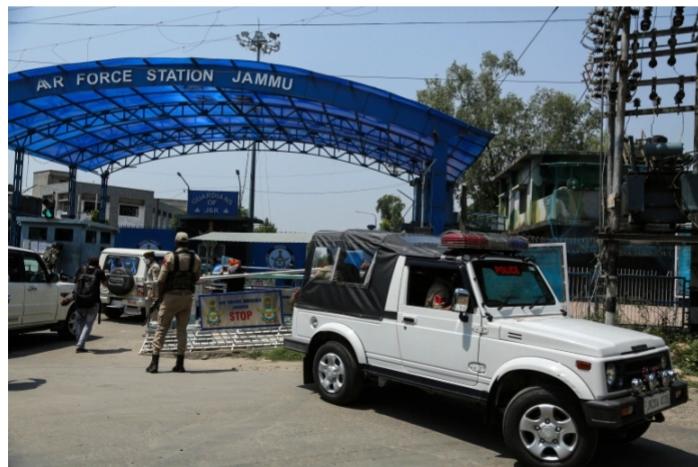Ever since Prime Minister Narendra Modi took office back in 2014, India-Pakistan relations have registered an increasingly downward trend. His anti-Pakistan agenda includes targeting the country on both the internal and external front. He has created an anti-Pakistan hype in the Indian public, whipped up propaganda in international forums and meddled in Pakistan’s internal matters solely for his political mileage. This anti-Pakistan narrative not only serves to increase his political stature in the eyes of the domestic audience, but also helps to conceal his policy failures. It is due to this reason that we continue to witness events that repeatedly flare up the rivalry between the two states. The recent drone attack in Jammu is a relevant example in this regard.
On 27th June, two 1.5 kilogram, pressure-activated explosive devices were allegedly dropped from an unidentified drone on an Indian Air Force (IAF) base in Jammu. The alleged attacks were conducted minutes apart from each other. One caused some damage to a single-story building, whereas the other one fell in an open, vacant area. Apart from minor injuries to two IAF personnel, the attack did not cause any on-ground damage.
This incident marks the first time that a drone has been employed for sub-conventional warfare in the Kashmir region. No outfit has claimed responsibility for this incident. As was expected, Indian investigation reports have blamed Pakistan. However, Pakistan’s involvement is unlikely given that it would be of no use to the country to facilitate such an attack. On the contrary, given the notorious activities of PM Modi’s regime, it can be assumed that this was a state-managed activity to defame Pakistan. Previously, a leaked WhatsApp conversation of an Indian journalist revealed that even the Pulwama attack was pre-planned and state-managed. Hence, it appears that this episode could also be part of India’s larger design of maligning Pakistan’s image internationally.
Prime Minister Modi has found the ongoing geopolitical environment ripe for creating tensions for Pakistan. The world is fully aware by now that if the US withdrawal from Afghanistan leads to instability, it would directly impact the security environment of Pakistan. The Indian policy is directed towards creating problems for Pakistan on the eastern border with such schemes, while instability may be knocking on the western border from Afghanistan. Secondly, a stand-off with Pakistan is something which would help to draw attention away from the failure of India’s policy in Afghanistan as it is losing its importance in the Afghan equation despite its heavy investments.
India is also using its assets inside Pakistan to destabilize it internally. On 23rd June, a bomb blast occurred in Lahore. Initial investigations revealed that it was sponsored by India. In a press conference, Pakistan’s National Security Adviser Dr Moeed Yusuf elaborated how links of the Lahore blast were traced back to India. According to him, forensic analysis of cell phones and other equipment clearly expose Indian involvement in the attack. These developments are indicative of India’s ambitions to weaken Pakistan at such a critical time.
It is indeed appalling that despite being severely impacted by the COVID-19 pandemic and uncontrolled spread of its Delta variant (which originated in India and is causing thousands of deaths every day), the Modi regime is engaged in such dangerous pursuits.
It is apparent that PM Modi has no interest in mending relations as spreading hatred against Pakistan is a vital element for his political survival. Furthermore, it is likely that India will continue financing and facilitating militant activities inside Pakistan.
Shortly after the Jammu drone attack, IAF initiated the process of acquiring 10 anti-drone systems reportedly from Israel and for installation on IAF bases. Reportedly, India is in the process of acquiring anti-drone systems from Israel. This just shows how New Delhi will keep using such state-managed activities as a pretext for acquisition of more weaponry.
The Jammu drone attack is going to adversely impact the security dynamics of the Jammu and Kashmir region and has the potential to jeopardise the ceasefire, signed between the Pakistan-India Director General Military Operations (DGMOs) in February 2021.
The incident in Jammu also highlights that the use of cross-border drone infiltration is likely to become more frequent in South Asia in the future. Drone warfare is inevitable in future combat which makes it imperative to prioritise their acquisition and employment.
At a time when the future of the region is uncertain following US withdrawal from Afghanistan, India is manipulating the fragile, strategic environment and its dangerous designs can pose serious security challenges. New Delhi’s actions suggest that it will make use of every existing opportunity to create problems for Pakistan which calls for more stringent and comprehensive security measures. Underlying India’s aggression is the Bharatiya Janata Party’s sole political objective – winning the hearts of its hardliner voters.
Shaza Arif is a Researcher at the Centre for Aerospace & Security Studies (CASS). She can be reached at cass.thinkers@gmail.com
Image Source: Web Desk. “Indian airforce base in Kashmir hit by explosions.” Al-Jazeera. June 27, 2021.




